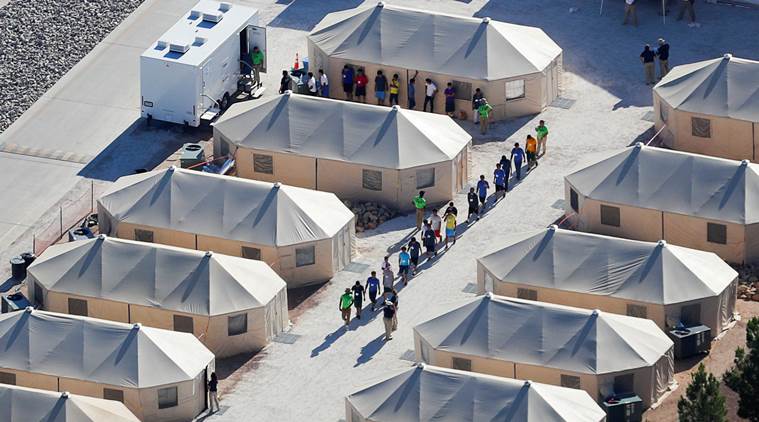For women in Greek migrant camps, even showers are unsafe: Amnesty
Humanitarian organizations working in the camp had reported that smugglers and people bearing weapons had been in the facility, Amnesty said.

Amnesty said women there said they felt “abandoned”. (Source: Reuters)
Women in Greek migrant camps are too scared to leave their tents at night or use communal showers, and many pregnant women have to sleep on the floor in unsanitary conditions, Amnesty International said on Friday. More than half of refugees and migrants arriving in Greece are women and children, according to the United Nations refugee agency, UNHCR.
The numbers are small compared to those at the height of Europe’s migrant crisis in 2015. But slow and lengthy asylum procedures mean thousands of asylum-seekers are holed up in crowded facilities on a few Greek islands.
50m

Negotiator in Time of War
Dutch UN representative Sigrid Kaag is looking for solutions to the refugee problem in Lebanon. The civil war in Syria is entering its fifth year. The number of refugees leaving hearth and home is taking on unparalleled proportions. In Europe the call for closing the borders is heard and politicians are more and more calling for reception in the region, but what does this actually mean? VPRO Backlight went to neighbouring Lebanon, where 1 in 4 inhabitants is now a refugee. There we followed UN Special Representative for Lebanon, Sigrid Kaag, who is faced with an enormous challenge. How do the Lebanese deal with this influx of new inhabitants? And what impact does the large number of refugees have on the already precarious balance in the region? If Lebanon falls, because the burden becomes too heavy, says Kaag, then Europe has a far bigger problem. In this world everything is connected, everything is global. It's all about shared opportunities and shared security and a better future for all. In the end that is also in Europe's best interest. Negotiator in Times of War shows the hectic life of Sigrid Kaag during her mission in Lebanon and follows her around from the Northern border with Syria to the most Southern border with Israel.
There, everyday activities like taking a shower have become dangerous for women and girls, Amnesty said in a report. Lack of sanitation and clean drinking water, as well as streams of raw sewage and mice infestations, are common in all camps, it said. ” shower in the camp is cold and there is no lock. Men walk in when you are inside. There are no lights in the toilets,” Amnesty quoted one woman from the Democratic Republic of Congo, whose name was changed to Adele, as saying.
“At night, sometimes I go to the toilet with my sister or pee in a bucket,” said Adele, who arrived on the island of Samos in December. Pregnant asylum-seekers told Amnesty they had to sleep on the floor and had little, if any, access to antenatal care. Other women spent their limited cash on sanitary pads.
“Everything is dirty here. It’s impossible to keep clean and when we have our period, it is very difficult,” Adele said.
Some of Greece’s island camps have grown so congested that they operate at more than double their capacity, according to the latest government figures. To ease overcrowding, authorities have begun moving hundreds to facilities on the mainland.
Some of Greece’s island camps have grown so congested that they operate at more than double their capacity, according to the latest government figures. To ease overcrowding, authorities have begun moving hundreds to facilities on the mainland.
Amnesty said women there said they felt “abandoned”. “We feel totally forgotten. Some of us have been in the camp for two years and nothing is changing. We don’t know what will happen to us,” said one Yezidi woman from Iraq staying in the Skaramagas camp near Athens.
Humanitarian organizations working in the camp had reported that smugglers and people bearing weapons had been in the facility, Amnesty said. “The enormous failure of European governments to open safe and legitimate routes to refugees fleeing war places women and girls at increased risk of abuse,” said Amnesty International Secretary-General Kumi Naidoo, who visited the island of Lesbos on Thursday.












































No hay comentarios:
Publicar un comentario